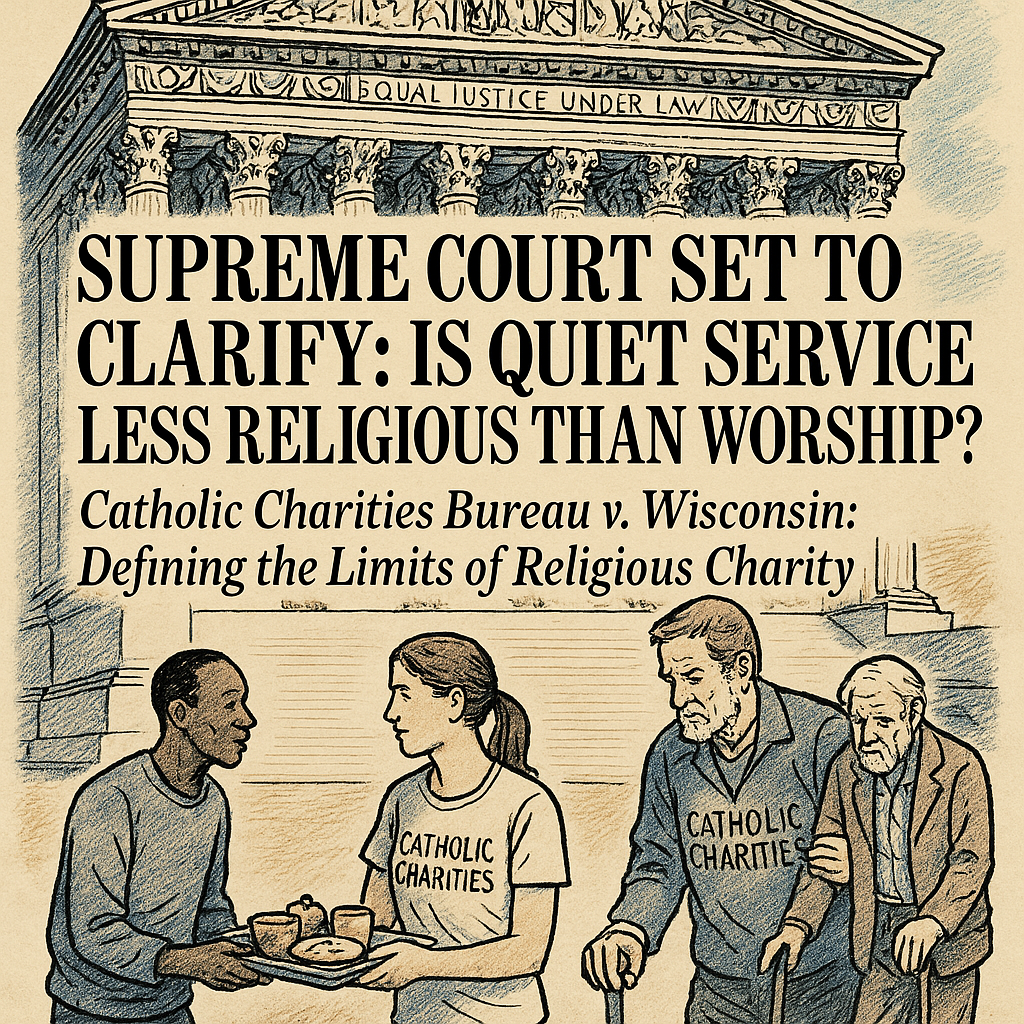Catholic Charities Bureau v. Wisconsin: Defining the Limits of Religious Charity
By Michael D. Peabody, Esq.
Issue: Whether a state violates the First Amendment’s religion clauses by denying a religious organization an otherwise-available tax exemption because the organization does not meet the state’s criteria for religious behavior.
In northern Wisconsin, a small Catholic charity quietly goes about the work of feeding the hungry, sheltering the homeless, and caring for those with disabilities—without ever asking the religion of those it serves. Yet Wisconsin courts have determined that the charity’s good deeds might make it too secular to receive a religious tax exemption. The Supreme Court is now poised to weigh in, considering a case that could redefine where American law draws the line between faith and charity.
The case, Catholic Charities Bureau, Inc. v. Wisconsin Labor & Industry Review Commission, revolves around Catholic Charities Bureau (CCB), the social ministry arm of the Diocese of Superior. Although clearly church-controlled—the local bishop oversees its operations—the state of Wisconsin found CCB’s activities insufficiently religious to qualify for an exemption from unemployment taxes, a privilege typically granted to religious organizations.
The exemption, established federally in 1970 and adopted by Wisconsin, exempts church-controlled groups that operate primarily for religious purposes from paying into state unemployment programs. Such groups often maintain their own internal systems for assisting unemployed workers, aligning with their spiritual missions.
However, when CCB applied for this exemption in 2016, Wisconsin’s labor agency denied the request. After several legal reversals, the Wisconsin Supreme Court ultimately ruled in 2024 that although the charity is sincerely motivated by Catholic teachings, its daily activities—feeding and sheltering people without religious instruction or worship—are fundamentally secular.
Justice Ann Walsh Bradley, writing for the majority, emphasized the secular nature of the charity’s operations, noting it provides services similar to secular organizations without attempting to instill religious beliefs or restricting services to members of the faith.
The dissent, led by Justice Rebecca Grassl Bradley, argued that the state’s approach unfairly penalizes faith groups for practicing religion through service rather than explicit proselytization. The dissent warned against government interference in determining the religious nature of such activities, suggesting Wisconsin’s ruling could favor overt religious expression over quiet charitable acts.
The charity, supported by various religious groups nationwide, appealed to the U.S. Supreme Court, framing the issue as a First Amendment violation—arguing that Wisconsin’s rule discriminates against religious groups whose mission involves charitable service without explicit evangelism.
Legal experts foresee two possible outcomes. The Court may decide Wisconsin discriminated against religious expression, ruling that states cannot second-guess the sincerity or religious nature of a church-controlled group’s charitable work. Such a decision would reaffirm the rights of religious charities to receive tax exemptions without compromising their inclusive missions.
Alternatively, the Court might uphold Wisconsin’s decision, agreeing that distinguishing between religious worship and secular social services is constitutionally permissible. Such a ruling would reinforce the idea that religious organizations, when operating in predominantly secular spaces, are subject to the same rules as secular entities.
Beyond legal precedent, the ruling could significantly affect the identity and operations of religious charities nationwide. At stake is how society legally values charitable acts—whether as inherently religious or fundamentally secular—and how states balance religious freedom with fair taxation practices.
The Supreme Court will hear arguments on Monday, October 31, 2025, with a decision expected by summer. Its ruling will likely clarify the role religious motivation plays in defining charitable endeavors, shaping how faith and public life intersect across the country.
Briefs and pleadings are available at https://www.supremecourt.gov/search.aspx?filename=/docket/docketfiles/html/public/23a1067.html
